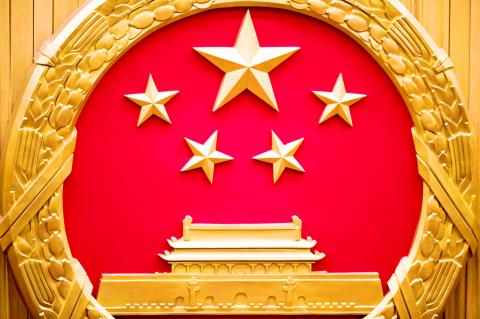China has called on the US to “correct its mistake” after US President Donald Trump approved new rules allowing top-level US officials to travel to Taiwan to meet with their Taiwanese counterparts.
US representatives can already travel to Taiwan and Taiwanese officials occasionally visit the White House, but meetings are usually low profile to avoid offending China.
The Taiwan Travel Act, which Trump signed on Friday following its passage in the US Congress, encourages visits between Taiwanese and US officials “at all levels.”

Photo: AFP
Washington cut formal diplomatic ties with Taiwan in 1979 in favor of Beijing under its “one China” policy, but it maintains trade relations with Taiwan and sells it weapons.
Chinese Ministry of Foreign Affairs spokesman Lu Kang (陸慷) said the act’s clauses, while not legally binding, “severely violate” Beijing’s “one China” principle and send “very wrong signals to the ‘pro-independence’ separatist forces in Taiwan.”
“China is strongly opposed to that,” Lu said in a statement issued on Saturday.
“We urge the US side to correct its mistake, stop pursuing any official ties with Taiwan or improving its current relations with Taiwan in any substantive way,” he said.
In a separate statement, Chinese Ministry of National Defense spokesman Colonel Wu Qian (吳謙) said the act “interferes in China’s internal affairs.”
China urges the US to “stop pursuing any US-Taiwan military ties and stop arms sales to Taiwan, so as to avoid causing serious damage to the bilateral and military relations between China and the US, and to the peace and stability in the Taiwan Strait,” Wu’s statement said.
The act describes Taiwan as “a beacon of democracy” in Asia, and states that “Taiwan’s democratic achievements inspire many countries and people in the region.”
Trump’s signature, announced late on Friday — when the White House usually tries to bury news — comes amid increasing tensions between Taiwan and China.
The new US law also comes amid trade tensions between Washington and Beijing as Trump mulls fresh tariff measures that have raised fears of a tit-for-tat trade war.

INVESTIGATION: The case is the latest instance of a DPP figure being implicated in an espionage network accused of allegedly leaking information to Chinese intelligence Democratic Progressive Party (DPP) member Ho Jen-chieh (何仁傑) was detained and held incommunicado yesterday on suspicion of spying for China during his tenure as assistant to then-minister of foreign affairs Joseph Wu (吳釗燮). The Taipei District Prosecutors’ Office said Ho was implicated during its investigation into alleged spying activities by former Presidential Office consultant Wu Shang-yu (吳尚雨). Prosecutors said there is reason to believe Ho breached the National Security Act (國家安全法) by leaking classified Ministry of Foreign Affairs information to Chinese intelligence. Following interrogation, prosecutors petitioned the Taipei District Court to detain Ho, citing concerns over potential collusion or tampering of evidence. The

Seventy percent of middle and elementary schools now conduct English classes entirely in English, the Ministry of Education said, as it encourages schools nationwide to adopt this practice Minister of Education (MOE) Cheng Ying-yao (鄭英耀) is scheduled to present a report on the government’s bilingual education policy to the Legislative Yuan’s Education and Culture Committee today. The report would outline strategies aimed at expanding access to education, reducing regional disparities and improving talent cultivation. Implementation of bilingual education policies has varied across local governments, occasionally drawing public criticism. For example, some schools have required teachers of non-English subjects to pass English proficiency

‘FORM OF PROTEST’: The German Institute Taipei said it was ‘shocked’ to see Nazi symbolism used in connection with political aims as it condemned the incident Sung Chien-liang (宋建樑), who led efforts to recall Democratic Progressive Party (DPP) Legislator Lee Kun-cheng (李坤城), was released on bail of NT$80,000 yesterday amid an outcry over a Nazi armband he wore to questioning the night before. Sung arrived at the New Taipei City District Prosecutors’ Office for questioning in a recall petition forgery case on Tuesday night wearing a red armband bearing a swastika, carrying a copy of Adolf Hitler’s Mein Kampf and giving a Nazi salute. Sung left the building at 1:15am without the armband and apparently covering the book with a coat. This is a serious international scandal and Chinese

NEGOTIATIONS: The US response to the countermeasures and plans Taiwan presented has been positive, including boosting procurement and investment, the president said Taiwan is included in the first group for trade negotiations with the US, President William Lai (賴清德) said yesterday, as he seeks to shield Taiwanese exporters from a 32 percent tariff. In Washington, US Trade Representative Jamieson Greer said in an interview on Fox News on Thursday that he would speak to his Taiwanese and Israeli counterparts yesterday about tariffs after holding a long discussion with the Vietnamese earlier. US President Donald Trump on Wednesday postponed punishing levies on multiple trade partners, including Taiwan, for three months after trillions of US dollars were wiped off global markets. He has maintained a 10 percent